Marshall Hodgson. Rethinking World History: Essays on Europe, Islam and World History
Подождите немного. Документ загружается.

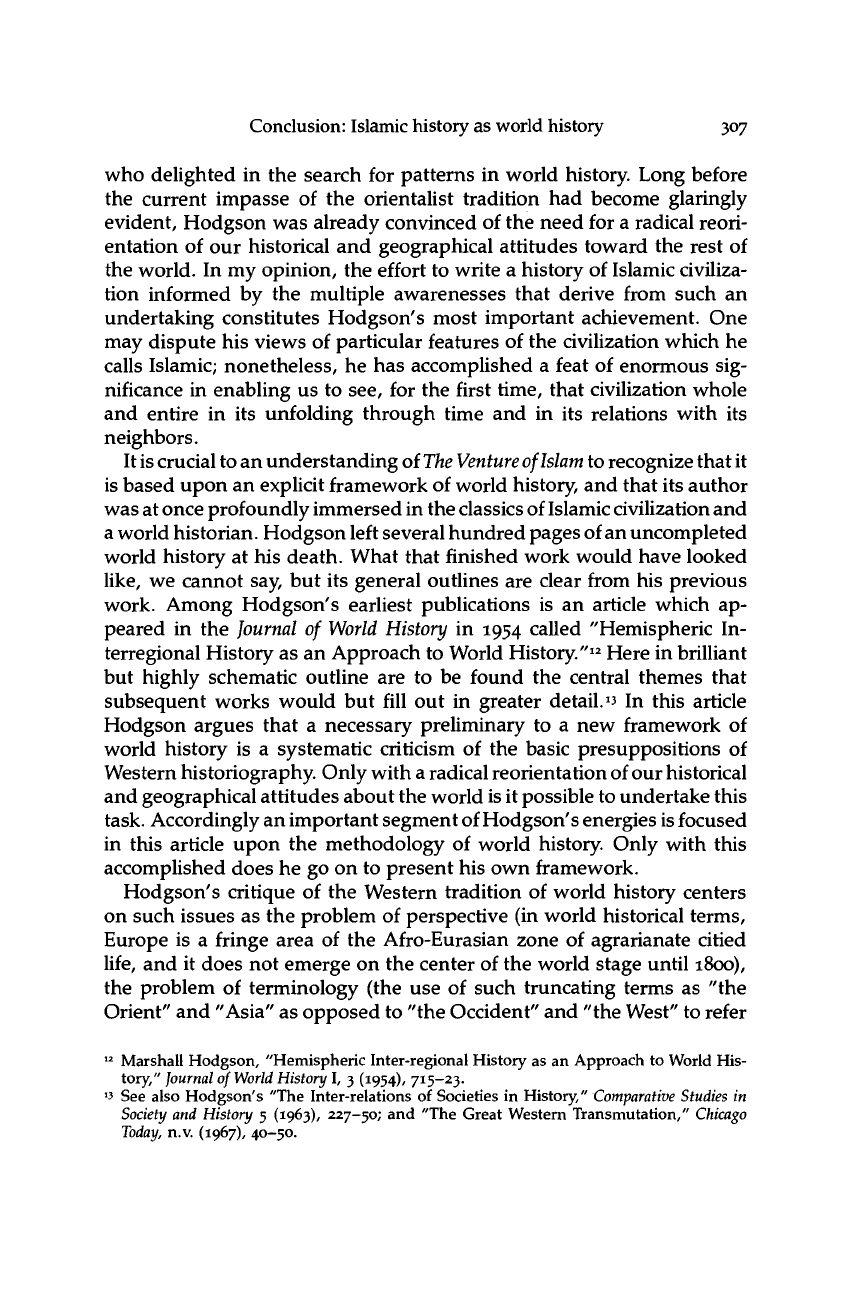
Conclusion: Islamic history as world history 307
who delighted in the search for patterns in world history. Long before
the current impasse of the orientalist tradition had become glaringly
evident, Hodgson was already convinced of the need for a radical reori-
entation of our historical and geographical attitudes toward the rest of
the world. In my opinion, the effort to write a history of Islamic civiliza-
tion informed by the multiple awarenesses that derive from such an
undertaking constitutes Hodgson's most important achievement. One
may dispute his views of particular features of the civilization which he
calls Islamic; nonetheless, he has accomplished a feat of enormous sig-
nificance in enabling us to see, for the first time, that civilization whole
and entire in its unfolding through time and in its relations with its
neighbors.
It is crucial to an understanding of
The
Venture of Islam to recognize that it
is based upon an explicit framework of world history, and that its author
was at once profoundly immersed in the classics of Islamic civilization and
a world historian. Hodgson left several hundred pages of an uncompleted
world history at his death. What that finished work would have looked
like,
we cannot say, but its general outlines are clear from his previous
work. Among Hodgson's earliest publications is an article which ap-
peared in the Journal of World History in 1954 called "Hemispheric In-
terregional History as an Approach to World History."
12
Here in brilliant
but highly schematic outline are to be found the central themes that
subsequent works would but fill out in greater detail.^ In this article
Hodgson argues that a necessary preliminary to a new framework of
world history is a systematic criticism of the basic presuppositions of
Western historiography. Only with a radical reorientation of our historical
and geographical attitudes about the world is it possible to undertake this
task. Accordingly an important segment of Hodgson's energies is focused
in this article upon the methodology of world history. Only with this
accomplished does he go on to present his own framework.
Hodgson's critique of the Western tradition of world history centers
on such issues as the problem of perspective (in world historical terms,
Europe is a fringe area of the Afro-Eurasian zone of agrarianate citied
life,
and it does not emerge on the center of the world stage until 1800),
the problem of terminology (the use of such truncating terms as "the
Orient" and "Asia" as opposed to "the Occident" and "the West" to refer
12
Marshall Hodgson, "Hemispheric Inter-regional History as an Approach to World His-
tory/
7
Journal
of
World
History I, 3 (1954), 715-23.
*3 See also Hodgson's 'The Inter-relations of Societies in History,"
Comparative Studies
in
Society
and
History
5 (1963), 227-50; and "The Great Western Transmutation,"
Chicago
Today,
n.v. (1967), 40-50.
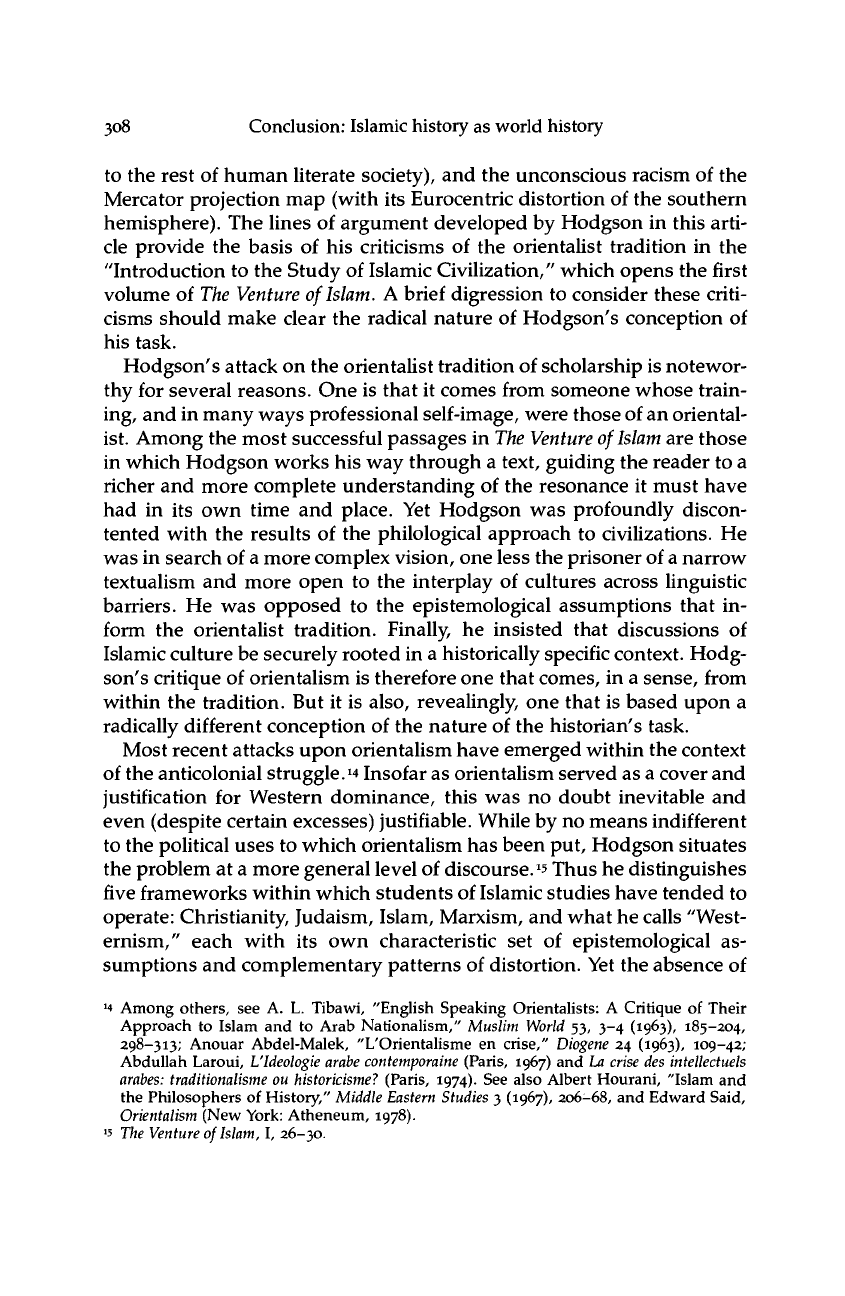
308 Conclusion: Islamic history as world history
to the rest of human literate society), and the unconscious racism of the
Mercator projection map (with its Eurocentric distortion of the southern
hemisphere). The lines of argument developed by Hodgson in this arti-
cle provide the basis of his criticisms of the orientalist tradition in the
"Introduction to the Study of Islamic Civilization/' which opens the first
volume of The Venture of Islam. A brief digression to consider these criti-
cisms should make clear the radical nature of Hodgson's conception of
his task.
Hodgson's attack on the orientalist tradition of scholarship is notewor-
thy for several reasons. One is that it comes from someone whose train-
ing, and in many ways professional self-image, were those of an oriental-
ist. Among the most successful passages in The Venture of
Islam
are those
in which Hodgson works his way through a text, guiding the reader to a
richer and more complete understanding of the resonance it must have
had in its own time and place. Yet Hodgson was profoundly discon-
tented with the results of the philological approach to civilizations. He
was in search of a more complex vision, one less the prisoner of a narrow
textualism and more open to the interplay of cultures across linguistic
barriers. He was opposed to the epistemological assumptions that in-
form the orientalist tradition. Finally, he insisted that discussions of
Islamic culture be securely rooted in a historically specific context. Hodg-
son's critique of orientalism is therefore one that comes, in a sense, from
within the tradition. But it is also, revealingly, one that is based upon a
radically different conception of the nature of the historian's task.
Most recent attacks upon orientalism have emerged within the context
of the anticolonial struggle.^ Insofar as orientalism served as a cover and
justification for Western dominance, this was no doubt inevitable and
even (despite certain excesses) justifiable. While by no means indifferent
to the political uses to which orientalism has been put, Hodgson situates
the problem at a more general level of discourse.^ Thus he distinguishes
five frameworks within which students of Islamic studies have tended to
operate: Christianity, Judaism, Islam, Marxism, and what he calls "West-
ernism," each with its own characteristic set of epistemological as-
sumptions and complementary patterns of distortion. Yet the absence of
*4 Among others, see A. L. Tibawi, "English Speaking Orientalists: A Critique of Their
Approach to Islam and to Arab Nationalism/' Muslim World 53, 3-4 (1963), 185-204,
298-313;
Anouar Abdel-Malek, "L'Orientalisme en crise," Diogene 24 (1963), 109-42;
Abdullah Laroui, L'Ideologic
arabe
contemporaine (Paris, 1967) and La crise des intellectuels
arabes:
traditionalisme ou historicisme? (Paris, 1974). See also Albert Hourani, "Islam and
the Philosophers of History/' Middle Eastern Studies 3 (1967), 206-68, and Edward Said,
Orientalism (New York: Atheneum, 1978).
^ The Venture of Islam, I, 26-30.
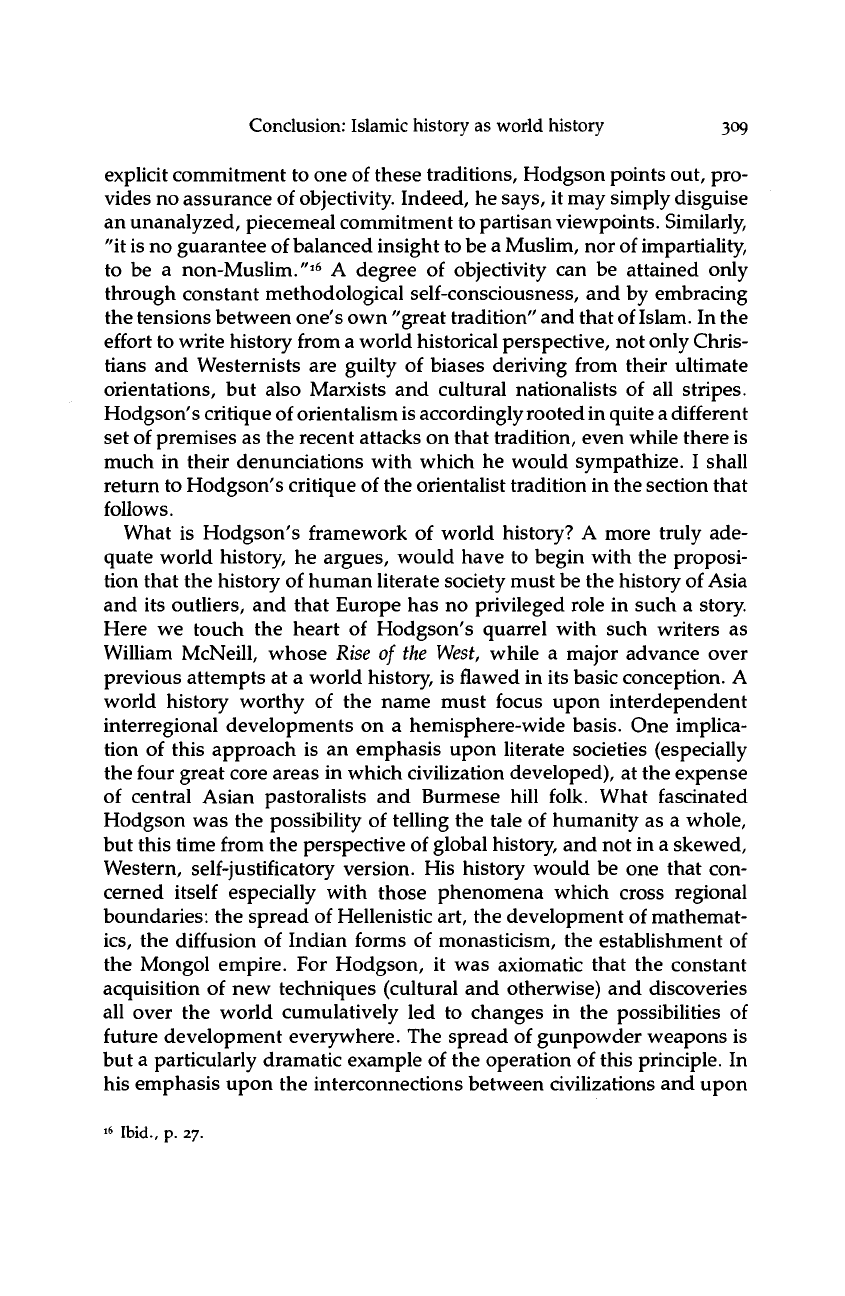
Conclusion: Islamic history as world history 309
explicit commitment to one of these traditions, Hodgson points out, pro-
vides no assurance of objectivity. Indeed, he says, it may simply disguise
an unanalyzed, piecemeal commitment to partisan viewpoints. Similarly,
"it is no guarantee of balanced insight to be a Muslim, nor of impartiality,
to be a non-Muslim."
16
A degree of objectivity can be attained only
through constant methodological self-consciousness, and by embracing
the tensions between one's own "great tradition" and that of
Islam.
In the
effort to write history from a world historical perspective, not only Chris-
tians and Westernists are guilty of biases deriving from their ultimate
orientations, but also Marxists and cultural nationalists of all stripes.
Hodgson's critique of orientalism
is
accordingly rooted in quite a different
set of premises as the recent attacks on that tradition, even while there is
much in their denunciations with which he would sympathize. I shall
return to Hodgson's critique of the orientalist tradition in the section that
follows.
What is Hodgson's framework of world history? A more truly ade-
quate world history, he argues, would have to begin with the proposi-
tion that the history of human literate society must be the history of Asia
and its outliers, and that Europe has no privileged role in such a story.
Here we touch the heart of Hodgson's quarrel with such writers as
William McNeill, whose Rise of the West, while a major advance over
previous attempts at a world history, is flawed in its basic conception. A
world history worthy of the name must focus upon interdependent
interregional developments on a hemisphere-wide basis. One implica-
tion of this approach is an emphasis upon literate societies (especially
the four great core areas in which civilization developed), at the expense
of central Asian pastoralists and Burmese hill folk. What fascinated
Hodgson was the possibility of telling the tale of humanity as a whole,
but this time from the perspective of global history, and not in a skewed,
Western, self-justificatory version. His history would be one that con-
cerned itself especially with those phenomena which cross regional
boundaries: the spread of Hellenistic art, the development of mathemat-
ics,
the diffusion of Indian forms of monasticism, the establishment of
the Mongol empire. For Hodgson, it was axiomatic that the constant
acquisition of new techniques (cultural and otherwise) and discoveries
all over the world cumulatively led to changes in the possibilities of
future development everywhere. The spread of gunpowder weapons is
but a particularly dramatic example of the operation of this principle. In
his emphasis upon the interconnections between civilizations and upon
16
Ibid., p. 27.
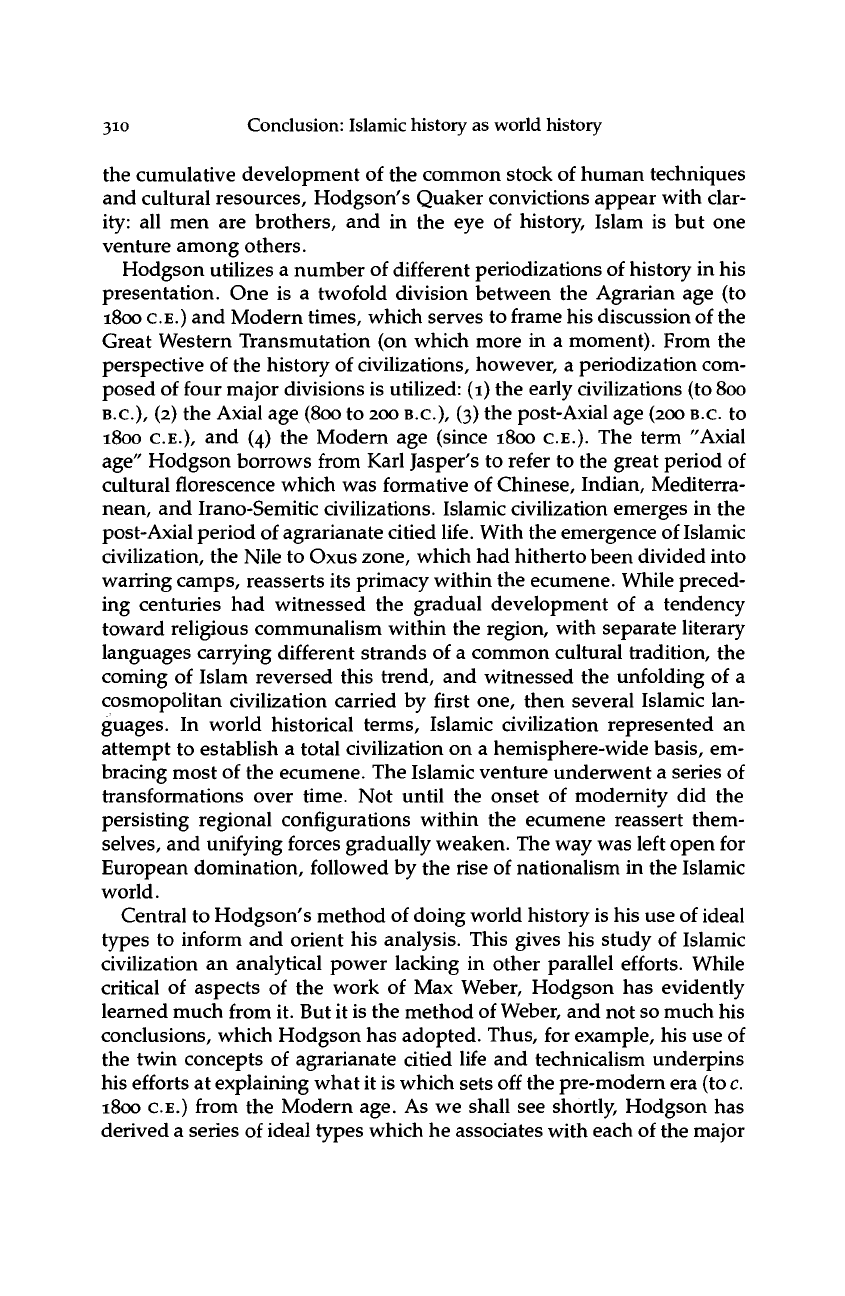
310 Conclusion: Islamic history as world history
the cumulative development of the common stock of human techniques
and cultural resources, Hodgson's Quaker convictions appear with clar-
ity: all men are brothers, and in the eye of history, Islam is but one
venture among others.
Hodgson utilizes a number of different periodizations of history in his
presentation. One is a twofold division between the Agrarian age (to
1800
C.E.)
and Modern times, which serves to frame his discussion of the
Great Western Transmutation (on which more in a moment). From the
perspective of the history of civilizations, however, a periodization com-
posed of four major divisions is utilized: (1) the early civilizations (to 800
B.C.), (2) the Axial age (800 to 200 B.C.), (3) the post-Axial age (200 B.C. to
1800 C.E.), and (4) the Modern age (since 1800 C.E.). The term "Axial
age"
Hodgson borrows from Karl Jasper's to refer to the great period of
cultural florescence which was formative of Chinese, Indian, Mediterra-
nean, and Irano-Semitic civilizations. Islamic civilization emerges in the
post-Axial period of agrarianate citied life. With the emergence of Islamic
civilization, the Nile to Oxus zone, which had hitherto been divided into
warring camps, reasserts its primacy within the ecumene. While preced-
ing centuries had witnessed the gradual development of a tendency
toward religious communalism within the region, with separate literary
languages carrying different strands of a common cultural tradition, the
coming of Islam reversed this trend, and witnessed the unfolding of a
cosmopolitan civilization carried by first one, then several Islamic lan-
guages. In world historical terms, Islamic civilization represented an
attempt to establish a total civilization on a hemisphere-wide basis, em-
bracing most of the ecumene. The Islamic venture underwent a series of
transformations over time. Not until the onset of modernity did the
persisting regional configurations within the ecumene reassert them-
selves, and unifying forces gradually weaken. The way was left open for
European domination, followed by the rise of nationalism in the Islamic
world.
Central to Hodgson's method of doing world history is his use of ideal
types to inform and orient his analysis. This gives his study of Islamic
civilization an analytical power lacking in other parallel efforts. While
critical of aspects of the work of Max Weber, Hodgson has evidently
learned much from it. But it is the method of Weber, and not so much his
conclusions, which Hodgson has adopted. Thus, for example, his use of
the twin concepts of agrarianate citied life and technicalism underpins
his efforts at explaining what it is which sets off the pre-modern era (to c.
1800
C.E.)
from the Modern age. As we shall see shortly, Hodgson has
derived a series of ideal types which he associates with each of the major
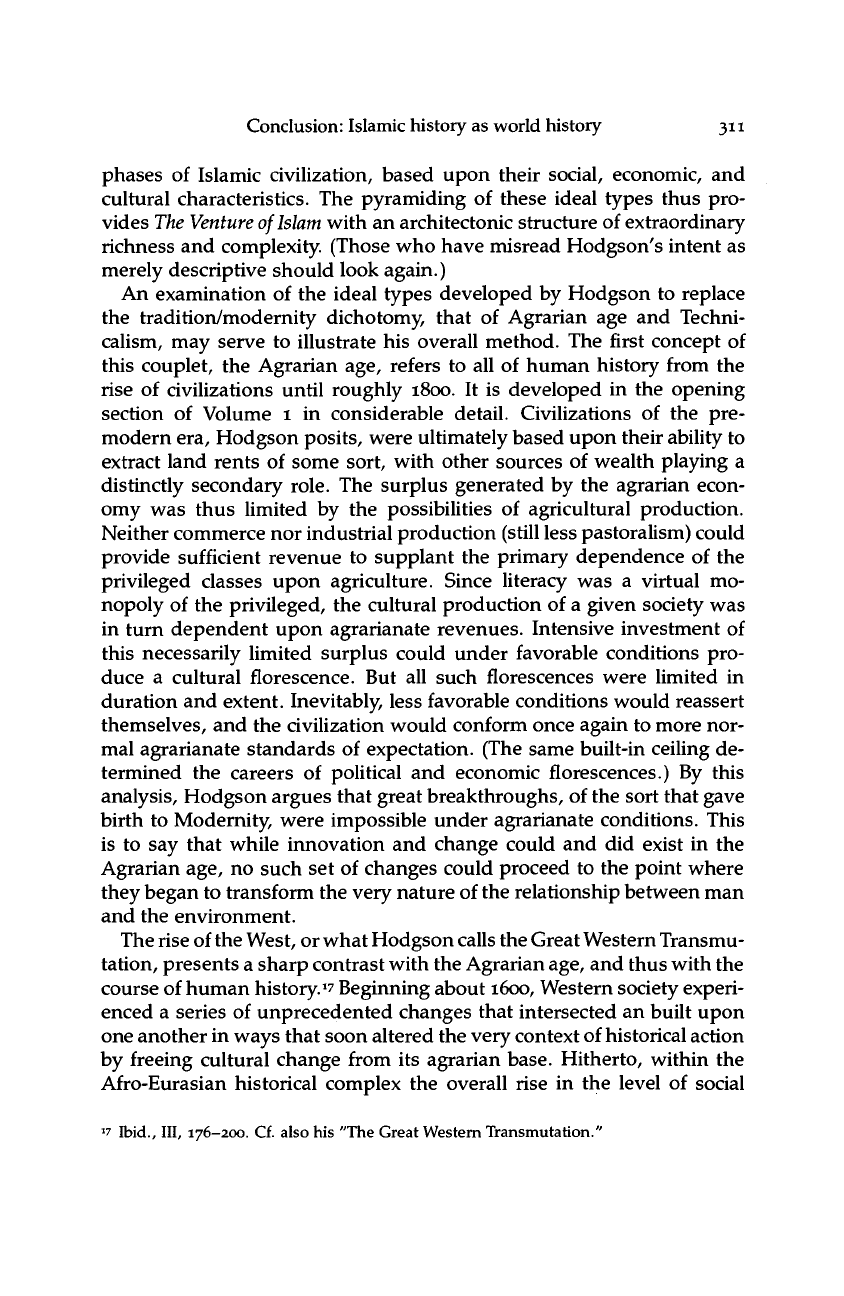
Conclusion: Islamic history as world history 311
phases of Islamic civilization, based upon their social, economic, and
cultural characteristics. The pyramiding of these ideal types thus pro-
vides
The Venture
of
Islam
with an architectonic structure of extraordinary
richness and complexity. (Those who have misread Hodgson's intent as
merely descriptive should look again.)
An examination of the ideal types developed by Hodgson to replace
the tradition/modernity dichotomy, that of Agrarian age and Techni-
calism, may serve to illustrate his overall method. The first concept of
this couplet, the Agrarian age, refers to all of human history from the
rise of civilizations until roughly 1800. It is developed in the opening
section of Volume 1 in considerable detail. Civilizations of the pre-
modern era, Hodgson posits, were ultimately based upon their ability to
extract land rents of some sort, with other sources of wealth playing a
distinctly secondary role. The surplus generated by the agrarian econ-
omy was thus limited by the possibilities of agricultural production.
Neither commerce nor industrial production (still less pastoralism) could
provide sufficient revenue to supplant the primary dependence of the
privileged classes upon agriculture. Since literacy was a virtual mo-
nopoly of the privileged, the cultural production of a given society was
in turn dependent upon agrarianate revenues. Intensive investment of
this necessarily limited surplus could under favorable conditions pro-
duce a cultural florescence. But all such florescences were limited in
duration and extent. Inevitably, less favorable conditions would reassert
themselves, and the civilization would conform once again to more nor-
mal agrarianate standards of expectation. (The same built-in ceiling de-
termined the careers of political and economic florescences.) By this
analysis, Hodgson argues that great breakthroughs, of the sort that gave
birth to Modernity, were impossible under agrarianate conditions. This
is to say that while innovation and change could and did exist in the
Agrarian age, no such set of changes could proceed to the point where
they began to transform the very nature of the relationship between man
and the environment.
The rise of the West, or what Hodgson
calls
the Great Western Transmu-
tation, presents a sharp contrast with the Agrarian
age,
and thus with the
course of human history.
1
? Beginning about 1600, Western society experi-
enced a series of unprecedented changes that intersected an built upon
one another in ways that soon altered the very context of historical action
by freeing cultural change from its agrarian base. Hitherto, within the
Afro-Eurasian historical complex the overall rise in the level of social
*7 Ibid., Ill, 176-200. Cf. also his 'The Great Western Transmutation/
7
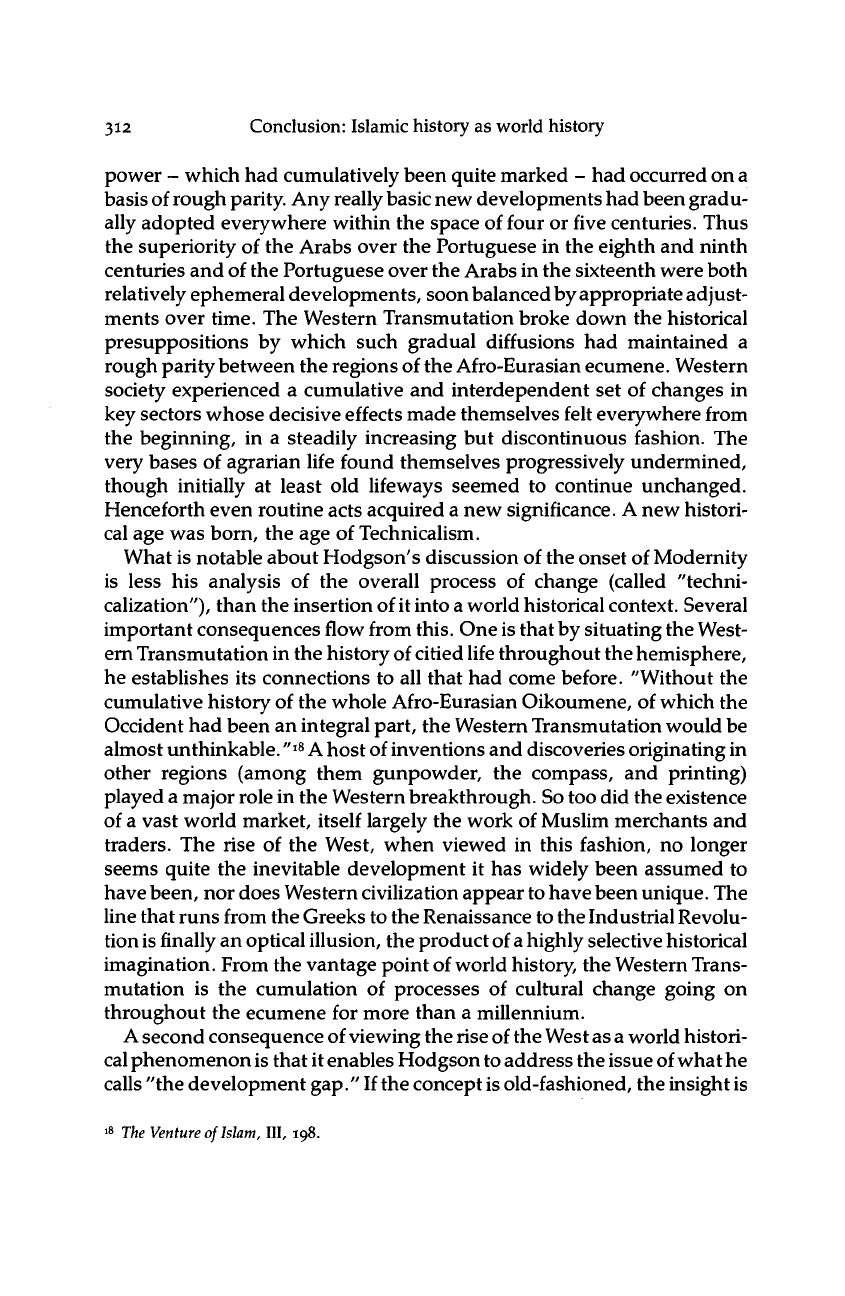
312 Conclusion: Islamic history as world history
power - which had cumulatively been quite marked - had occurred on a
basis of rough
parity.
Any really basic new developments had been gradu-
ally adopted everywhere within the space of four or five centuries. Thus
the superiority of the Arabs over the Portuguese in the eighth and ninth
centuries and of the Portuguese over the Arabs in the sixteenth were both
relatively ephemeral developments, soon balanced by appropriate adjust-
ments over time. The Western Transmutation broke down the historical
presuppositions by which such gradual diffusions had maintained a
rough parity between the regions of the Afro-Eurasian ecumene. Western
society experienced a cumulative and interdependent set of changes in
key sectors whose decisive effects made themselves felt everywhere from
the beginning, in a steadily increasing but discontinuous fashion. The
very bases of agrarian life found themselves progressively undermined,
though initially at least old life ways seemed to continue unchanged.
Henceforth even routine acts acquired a new significance. A new histori-
cal age was born, the age of Technicalism.
What is notable about Hodgson's discussion of the onset of Modernity
is less his analysis of the overall process of change (called "techni-
calization"), than the insertion of it into a world historical context. Several
important consequences flow from
this.
One is that by situating the West-
ern Transmutation in the history of citied life throughout the hemisphere,
he establishes its connections to all that had come before. "Without the
cumulative history of the whole Afro-Eurasian Oikoumene, of which the
Occident had been an integral part, the Western Transmutation would be
almost unthinkable.
"
l8
A
host of inventions and discoveries originating in
other regions (among them gunpowder, the compass, and printing)
played a major role in the Western breakthrough. So too did the existence
of a vast world market, itself largely the work of Muslim merchants and
traders. The rise of the West, when viewed in this fashion, no longer
seems quite the inevitable development it has widely been assumed to
have been, nor does Western civilization appear to have been unique. The
line that runs from the Greeks to the Renaissance to the Industrial Revolu-
tion
is
finally an optical illusion, the product of
a
highly selective historical
imagination. From the vantage point of world history, the Western Trans-
mutation is the cumulation of processes of cultural change going on
throughout the ecumene for more than a millennium.
A second consequence of viewing the rise of the West as a world histori-
cal
phenomenon
is
that it enables Hodgson to address the issue of what he
calls "the development gap." If the concept
is
old-fashioned, the insight is
18
The
Venture
of
Islam,
III, 198.
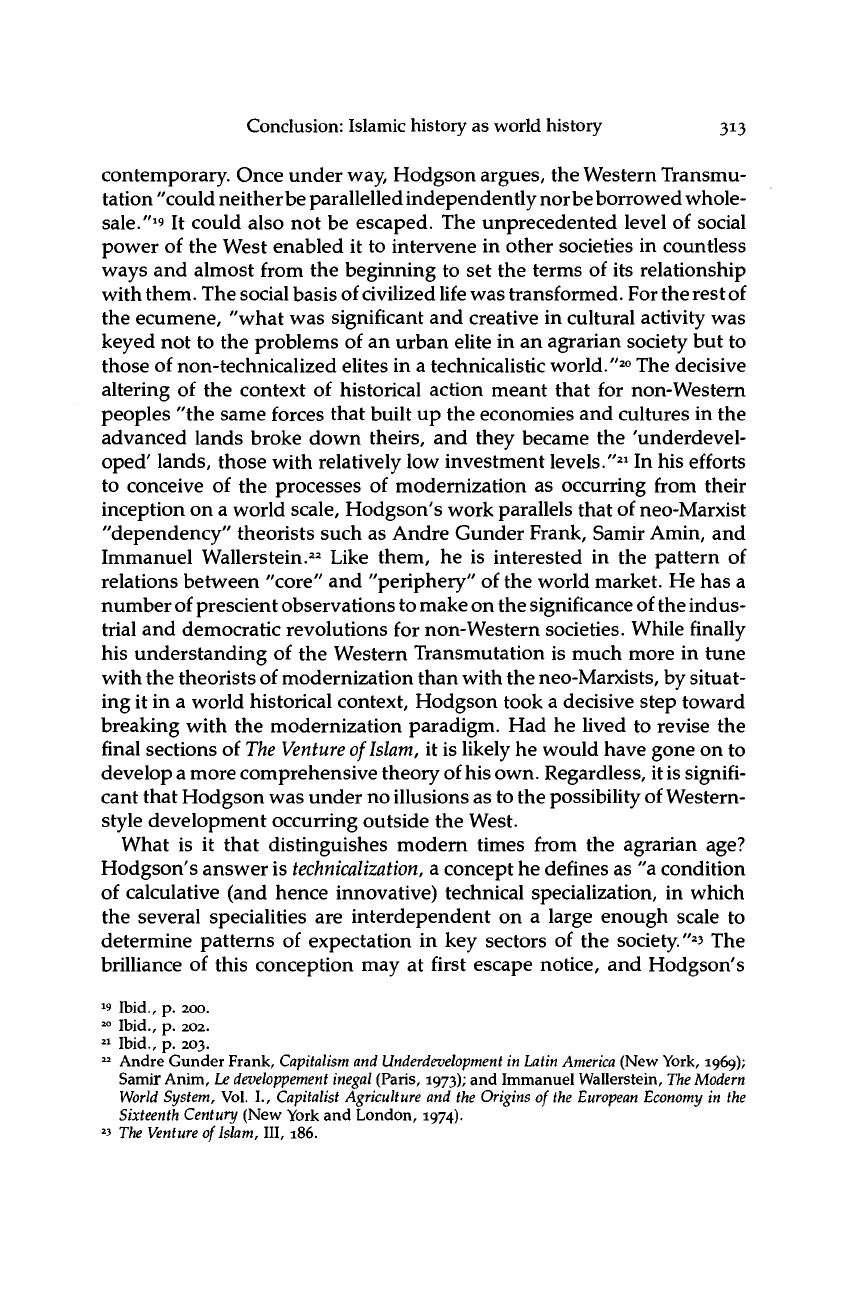
Conclusion: Islamic history as world history 313
contemporary. Once under way, Hodgson argues, the Western Transmu-
tation "could neither be parallelled independently nor be borrowed whole-
sale.
"^ It could also not be escaped. The unprecedented level of social
power of the West enabled it to intervene in other societies in countless
ways and almost from the beginning to set the terms of its relationship
with them. The social basis of civilized life was transformed. For the rest
of
the ecumene, "what was significant and creative in cultural activity was
keyed not to the problems of an urban elite in an agrarian society but to
those of non-technicalized elites in a technicalistic world/'
20
The decisive
altering of the context of historical action meant that for non-Western
peoples "the same forces that built up the economies and cultures in the
advanced lands broke down theirs, and they became the 'underdevel-
oped' lands, those with relatively low investment levels."
21
In his efforts
to conceive of the processes of modernization as occurring from their
inception on a world scale, Hodgson's work parallels that of neo-Marxist
"dependency" theorists such as Andre Gunder Frank, Samir Amin, and
Immanuel Waller stein.
22
Like them, he is interested in the pattern of
relations between "core" and "periphery" of the world market. He has a
number of prescient observations to make on the significance of the indus-
trial and democratic revolutions for non-Western societies. While finally
his understanding of the Western Transmutation is much more in tune
with the theorists of modernization than with the neo-Marxists, by situat-
ing it in a world historical context, Hodgson took a decisive step toward
breaking with the modernization paradigm. Had he lived to revise the
final sections of
The Venture
of
Islam,
it is likely he would have gone on to
develop a more comprehensive theory of his own. Regardless, it
is
signifi-
cant that Hodgson was under no illusions as to the possibility of Western-
style development occurring outside the West.
What is it that distinguishes modern times from the agrarian age?
Hodgson's answer is
technicalization,
a concept he defines as "a condition
of calculative (and hence innovative) technical specialization, in which
the several specialities are interdependent on a large enough scale to
determine patterns of expectation in key sectors of the society. "
2
3 The
brilliance of this conception may at first escape notice, and Hodgson's
x
* Ibid., p. 200.
20
Ibid., p. 202.
21
Ibid., p. 203.
22
Andre Gunder Frank, Capitalism and
Underdevelopment
in
Latin America
(New York, 1969);
Samir Anim, he developpement inegal (Paris, 1973); and Immanuel Wallerstein, The Modern
World System, Vol. I., Capitalist Agriculture and the Origins of the
European
Economy in the
Sixteenth Century (New York and London, 1974).
2
3
The
Venture
of
Islam,
III, 186.
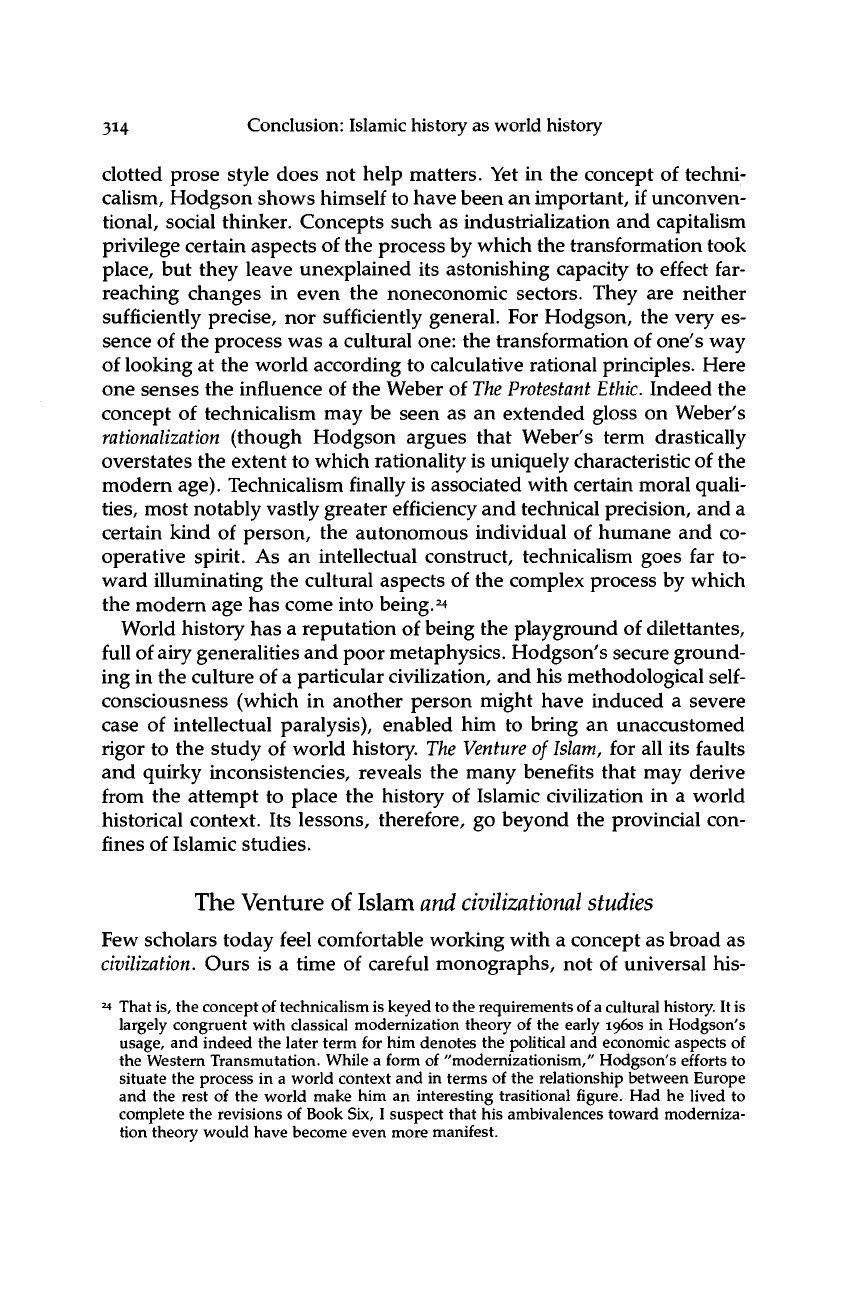
314 Conclusion: Islamic history
as
world history
clotted prose style does
not
help matters.
Yet in the
concept
of
techni-
calism, Hodgson shows himself
to
have been
an
important,
if
unconven-
tional, social thinker. Concepts such
as
industrialization
and
capitalism
privilege certain aspects
of the
process
by
which
the
transformation took
place,
but
they leave unexplained
its
astonishing capacity
to
effect
far-
reaching changes
in
even
the
noneconomic sectors. They
are
neither
sufficiently precise,
nor
sufficiently general.
For
Hodgson,
the
very
es-
sence
of the
process
was a
cultural one:
the
transformation
of
one's
way
of looking
at the
world according
to
calculative rational principles. Here
one senses
the
influence
of the
Weber
of
The Protestant Ethic. Indeed
the
concept
of
technicalism
may be
seen
as an
extended gloss
on
Weber's
rationalization (though Hodgson argues that Weber's term drastically
overstates
the
extent
to
which rationality
is
uniquely characteristic
of the
modern age). Technicalism finally
is
associated with certain moral quali-
ties,
most notably vastly greater efficiency
and
technical precision,
and a
certain kind
of
person,
the
autonomous individual
of
humane
and co-
operative spirit.
As an
intellectual construct, technicalism goes
far to-
ward illuminating
the
cultural aspects
of the
complex process
by
which
the modern
age has
come into being.
2
*
World history
has a
reputation
of
being
the
playground
of
dilettantes,
full
of
airy generalities
and
poor metaphysics. Hodgson's secure ground-
ing
in the
culture
of a
particular civilization,
and his
methodological
self-
consciousness (which
in
another person might have induced
a
severe
case
of
intellectual paralysis), enabled
him to
bring
an
unaccustomed
rigor
to the
study
of
world history.
The
Venture
of
Islam,
for all its
faults
and quirky inconsistencies, reveals
the
many benefits that
may
derive
from
the
attempt
to
place
the
history
of
Islamic civilization
in a
world
historical context.
Its
lessons, therefore,
go
beyond
the
provincial
con-
fines
of
Islamic studies.
The Venture of Islam and
civilizational
studies
Few scholars today feel comfortable working with
a
concept
as
broad
as
civilization.
Ours
is a
time
of
careful monographs,
not of
universal
his-
*4 That
is,
the concept
of
technicalism is keyed to the requirements of
a
cultural history. It is
largely congruent with classical modernization theory
of the
early 1960s
in
Hodgson's
usage,
and
indeed
the
later term
for him
denotes
the
political
and
economic aspects of
the Western Transmutation. While
a
form
of
"modernizationism," Hodgson's efforts
to
situate
the
process
in a
world context
and in
terms
of
the relationship between Europe
and
the
rest
of the
world make
him an
interesting trasitional figure.
Had he
lived
to
complete
the
revisions
of
Book Six,
I
suspect that
his
ambivalences toward moderniza-
tion theory would have become even more manifest.
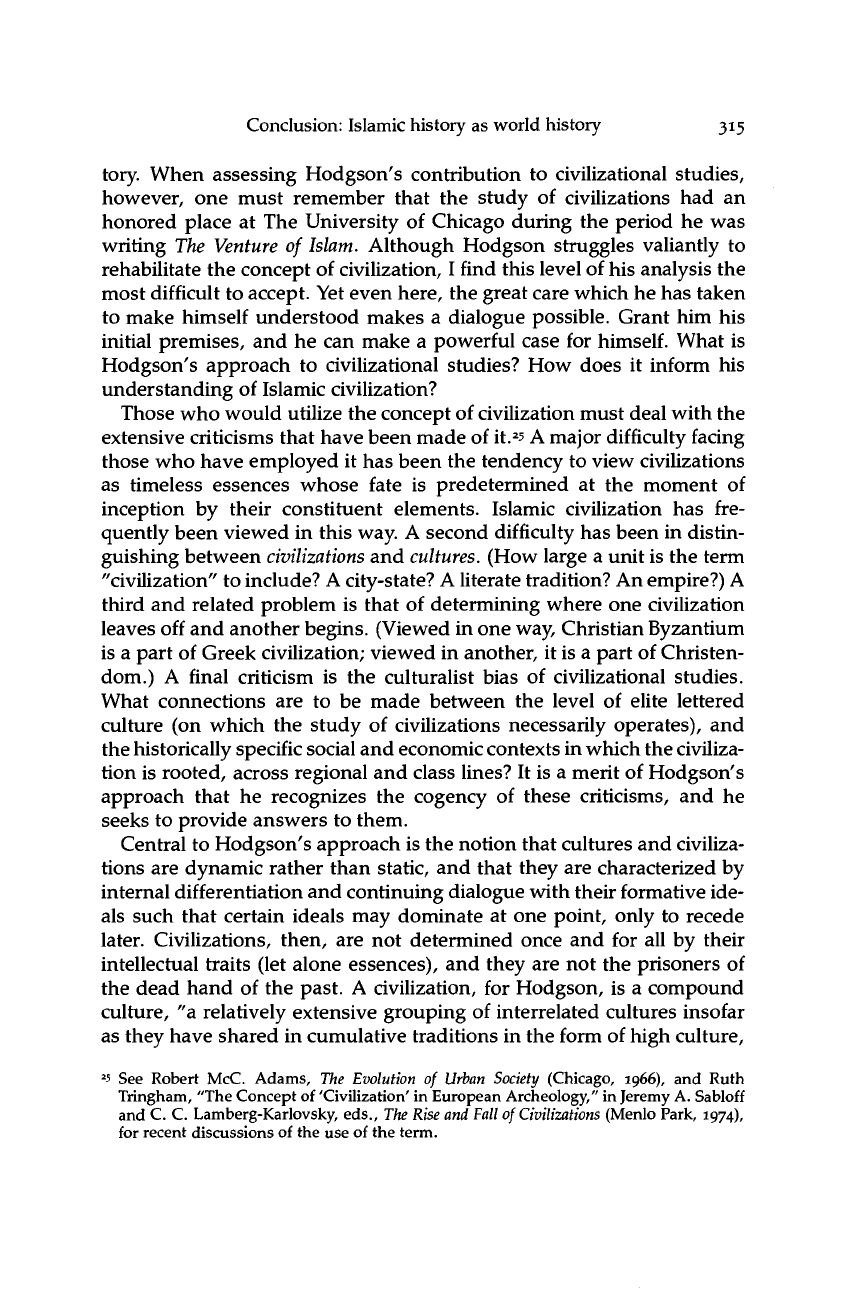
Conclusion: Islamic history as world history 315
tory. When assessing Hodgson's contribution to civilizational studies,
however, one must remember that the study of civilizations had an
honored place at The University of Chicago during the period he was
writing The Venture of Islam. Although Hodgson struggles valiantly to
rehabilitate the concept of civilization, I find this level of his analysis the
most difficult to accept. Yet even here, the great care which he has taken
to make himself understood makes a dialogue possible. Grant him his
initial premises, and he can make a powerful case for
himself.
What is
Hodgson's approach to civilizational studies? How does it inform his
understanding of Islamic civilization?
Those who would utilize the concept of civilization must deal with the
extensive criticisms that have been made of it.
2
5 A major difficulty facing
those who have employed it has been the tendency to view civilizations
as timeless essences whose fate is predetermined at the moment of
inception by their constituent elements. Islamic civilization has fre-
quently been viewed in this way. A second difficulty has been in distin-
guishing between civilizations and cultures. (How large a unit is the term
"civilization" to include? A city-state? A literate tradition? An empire?) A
third and related problem is that of determining where one civilization
leaves off and another begins. (Viewed in one way, Christian Byzantium
is a part of Greek civilization; viewed in another, it is a part of Christen-
dom.) A final criticism is the culturalist bias of civilizational studies.
What connections are to be made between the level of elite lettered
culture (on which the study of civilizations necessarily operates), and
the historically specific social and economic contexts in which the civiliza-
tion is rooted, across regional and class lines? It is a merit of Hodgson's
approach that he recognizes the cogency of these criticisms, and he
seeks to provide answers to them.
Central to Hodgson's approach is the notion that cultures and civiliza-
tions are dynamic rather than static, and that they are characterized by
internal differentiation and continuing dialogue with their formative ide-
als such that certain ideals may dominate at one point, only to recede
later. Civilizations, then, are not determined once and for all by their
intellectual traits (let alone essences), and they are not the prisoners of
the dead hand of the past. A civilization, for Hodgson, is a compound
culture, "a relatively extensive grouping of interrelated cultures insofar
as they have shared in cumulative traditions in the form of high culture,
2
5 See Robert McC. Adams, The
Evolution
of
Urban Society
(Chicago, 1966), and Ruth
Tringham, 'The Concept of 'Civilization
7
in European Archeology/' in Jeremy A. Sabloff
and C. C. Lamberg-Karlovsky, eds.,
The Rise and Fall of Civilizations
(Menlo Park, 1974),
for recent discussions of the use of the term.
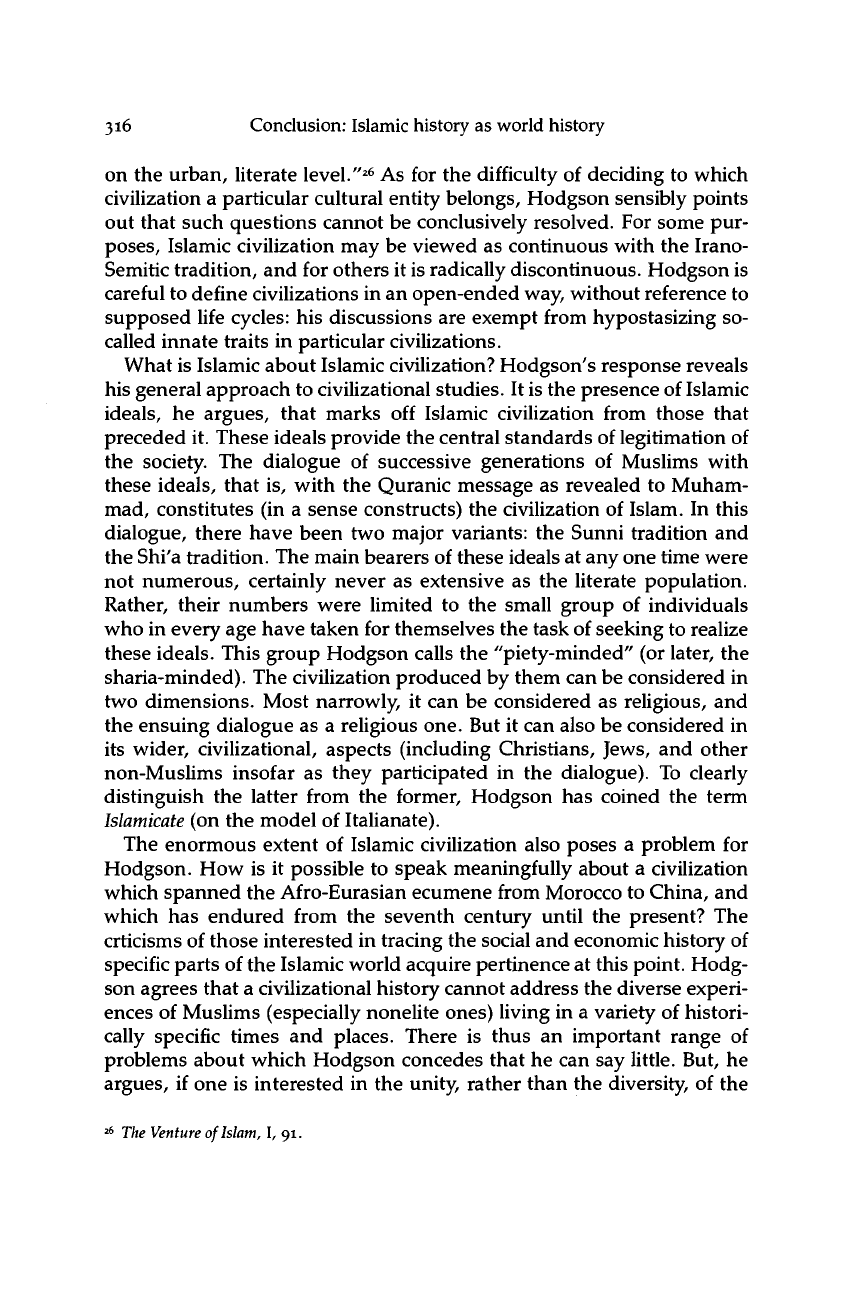
316 Conclusion: Islamic history as world history
on the urban, literate level."
26
As for the difficulty of deciding to which
civilization a particular cultural entity belongs, Hodgson sensibly points
out that such questions cannot be conclusively resolved. For some pur-
poses,
Islamic civilization may be viewed as continuous with the Irano-
Semitic tradition, and for others it is radically discontinuous. Hodgson is
careful to define civilizations in an open-ended way, without reference to
supposed life cycles: his discussions are exempt from hypostasizing so-
called innate traits in particular civilizations.
What is Islamic about Islamic civilization? Hodgson's response reveals
his general approach to civilizational studies. It is the presence of Islamic
ideals,
he argues, that marks off Islamic civilization from those that
preceded it. These ideals provide the central standards of legitimation of
the society. The dialogue of successive generations of Muslims with
these ideals, that is, with the Quranic message as revealed to Muham-
mad, constitutes (in a sense constructs) the civilization of Islam. In this
dialogue, there have been two major variants: the Sunni tradition and
the Shi'a tradition. The main bearers of these ideals at any one time were
not numerous, certainly never as extensive as the literate population.
Rather, their numbers were limited to the small group of individuals
who in every age have taken for themselves the task of seeking to realize
these ideals. This group Hodgson calls the "piety-minded" (or later, the
sharia-minded). The civilization produced by them can be considered in
two dimensions. Most narrowly, it can be considered as religious, and
the ensuing dialogue as a religious one. But it can also be considered in
its wider, civilizational, aspects (including Christians, Jews, and other
non-Muslims insofar as they participated in the dialogue). To clearly
distinguish the latter from the former, Hodgson has coined the term
Islamicate (on the model of Italianate).
The enormous extent of Islamic civilization also poses a problem for
Hodgson. How is it possible to speak meaningfully about a civilization
which spanned the Afro-Eurasian ecumene from Morocco to China, and
which has endured from the seventh century until the present? The
crticisms of those interested in tracing the social and economic history of
specific parts of the Islamic world acquire pertinence at this point. Hodg-
son agrees that a civilizational history cannot address the diverse experi-
ences of Muslims (especially nonelite ones) living in a variety of histori-
cally specific times and places. There is thus an important range of
problems about which Hodgson concedes that he can say little. But, he
argues, if one is interested in the unity, rather than the diversity, of the
26
The Venture of Islam,
I,
91.
